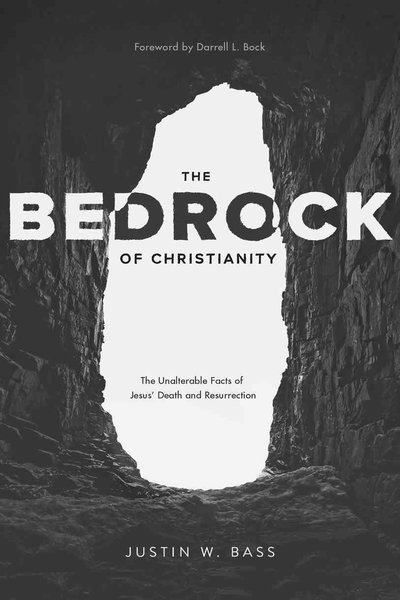Learning to Lament in an Age of Pandemic
By Paul M. Gould | Plus, "The Bedrock of Christianity"
Greetings! We hope you enjoy this article from the April edition of The Worldview Bulletin. Paul Gould explores how we can lament losses during the pandemic while also embracing hope and growth.
Blessings,
Christopher Reese
Managing Editor

Learning to Lament in an Age of Pandemic
by Paul M. Gould
There are two inevitable things, according to Ben Franklin: death and taxes. I’d like to add a third: loss. Perhaps this is the common thread behind the Franklin quip. Loss is part of life. This has never been more apparent to me, and perhaps to all of us, than now. We are in the midst of a worldwide pandemic. People are dying daily. Taxes are due, although the deadline has been extended. But there is more: loss at almost every level. The loss of health. The loss of a job. The loss of human community and touch. The loss of graduation parties. The loss of being together with fellow students in a class, or in the dorm, or at a restaurant. There is gain too: extended time with family (for me, we have the family under one roof, which is harder and harder as kids grow older), the promise of spring, acts of kindness, courage among first-responders, and new and unlikely heroes.
But certain questions become more pressing in times of loss: Where is God? How do I cope with loss? How do I lament well and still hope in God? We are reminded that the world is currently not the way it’s supposed to be. We question the goodness of God in times of loss and we seek an object worthy of our hope and trust in order to make our way through the valley. How can we trust in the goodness of God and lament well in times of loss? In this essay, I want to share some thoughts on loss, lament, and hope from the book by Gerald Sittser called A Grace Disguised.[1] Sittser’s book is my “go-to” book when I am personally in the midst of loss and it is the first book I give to others in the midst of their loss too. Sittser writes out of his own catastrophic loss: the death of his mother, wife, and one of his children in a tragic car accident.
The first thing to realize, according to Sittser, is that all loss is loss, whatever the circumstances: “All loss is bad, only bad in different ways. No two losses are ever the same. Each loss stands on its own and inflicts a unique kind of pain. What makes each loss so catastrophic is its devastating, cumulative, and irreversible nature.”[2] There is no need to minimize your loss when compared to others. To be sure, the death of a loved one is a tragic loss. But smaller losses—the canceled graduation of a daughter from high school, being far-removed from your friends as you finish a college semester online—are still losses. There is still pain.
Second, we can’t shield ourselves from loss. We have always been vulnerable to loss. This pandemic just makes our fragile nature more obvious. As Sittser writes, “There is little we can do to protect ourselves from these losses. They are as inevitable as old age, wrinkled skin, aching bones, and fading memory.”[3] We shouldn’t be surprised when we experience loss. It is just part and parcel of what it means to live “under the sun.”
Third, our response to loss is what matters most. “There is much we can do, however, to determine how to respond to [loss]. We do not always have the freedom to choose the roles we must play in life, but we can choose how we are going to play the roles we have been given.”[4] The challenge before us in the face of loss is this: will we diminish or enlarge our soul? Will we allow the loss to transform us, making us more like Christ, or will the loss destroy us, shrinking our souls and making us bitter and small people? Sorrow and lament can enlarge the soul if we let it do its work:
Sorrow [and lament] indicates that people who have suffered loss are living authentically in a world of misery, and it expresses the emotional anguish of people who feel pain for themselves and others. Sorrow is noble and gracious. It enlarges the soul until the soul is capable of mourning and rejoicing simultaneously, of feeling the world’s pain and hoping for the world’s healing at the same time. However painful, sorrow is good for the soul.[5]
Mourning and rejoicing simultaneously: what a beautiful picture of the hope we have in Christ in a fallen world. My encouragement to you in this time of fear and loss is to lean into it, and more importantly, to lean into God with the loss. As David proclaimed in his own season of trouble:
I remain confident of this: I will see the goodness of the Lord in the land of the living. Wait for the Lord; be strong and take heart and wait for the Lord. (Psalm 27:13-14)
We can be confident—not because we have the strength on our own to make it through this time—but because God is and is good. God cares for you. God cares about the deep desires of your heart (Psalm 37:4): for health, work, meaning, relationships, and more. And so we wait. But we don’t wait as those without hope. Because of Jesus and the resurrection, our hope is a “living hope” (1 Peter 1:3).
The challenge before us in this time of loss, according to Sittser, is to “face the darkness of the loss on the one hand, and [learn] to live with renewed vitality and gratitude on the other. This challenge is met when we learn to take the loss into ourselves and to be enlarged by it, so that our capacity to live life well and to know God intimately increases.”[6] Amen. May you experience the grace, love, comfort, and mercy of God in this time of loss and fear. May we all allow the loss to enlarge our souls that we would become more like Christ.
P. S. To help us lament well, I also recommend to you Doug Groothuis’s book Walking Through Twilight: A Wife’s Illness—a Philosopher’s Lament and C. S. Lewis’s A Grief Observed.
— Paul Gould is founder and president of the Two Tasks Institute and a Visiting Fellow at the Henry Center for Theological Understanding at Trinity Evangelical Divinity School. He is also co-host of the Eudo Podcast and the author or editor of Cultural Apologetics, The Story of the Cosmos, and Philosophy: A Christian Introduction.
Notes
[1] Gerald L. Sittser, A Grace Disguised: How the Soul Grows Through Loss (Grand Rapids, MI: Zondervan, 1995).
[2] Ibid., 25.
[3] Ibid., 37.
[4] Ibid.
[5] Ibid. 63.
[6] Ibid. 180.
Book Highlight
One of the unique aspects of the Christian faith is how strongly it’s tied to people and events in history. While a number of religions are based primarily on a philosophy, Christianity depends entirely on the historical reality of the life, death, and resurrection of Jesus of Nazareth. As the apostle Paul wrote, “If Christ has not been raised, our preaching is useless and so is your faith” (1 Corinthians 15:14). In The Bedrock of Christianity: The Unalterable Facts of Jesus' Death and Resurrection, author Justin Bass demonstrates a historical scholarly consensus concerning the death, resurrection, and post-resurrection appearances of Jesus, as well as the rise of the Christian movement. Citing scholars across the ideological spectrum, Bass shows that these key events are acknowledged as historically sound, and that the best explanation of them is that Jesus rose from the dead.

“Very highly recommended.”
— Gary R. Habermas, Distinguished Research Professor & Chair, Philosophy Department, Liberty University
“Justin Bass takes us down to the core historical facts which have to be explained, surveys the best historical scholarship on each, and shows why ultimately they point towards a risen Lord.”
— Andrew Wilson, Teaching Pastor, King’s Church London; author of If God, Then What
Find The Bedrock of Christianity at Amazon, Lexham Press, and other major booksellers.
* This is a sponsored post.
Subscribe
Subscribe to The Worldview Bulletin and receive a master class in worldview training, delivered monthly directly to your inbox. Receive a year’s worth of equipping for the discounted price of only $3.75 per month!


